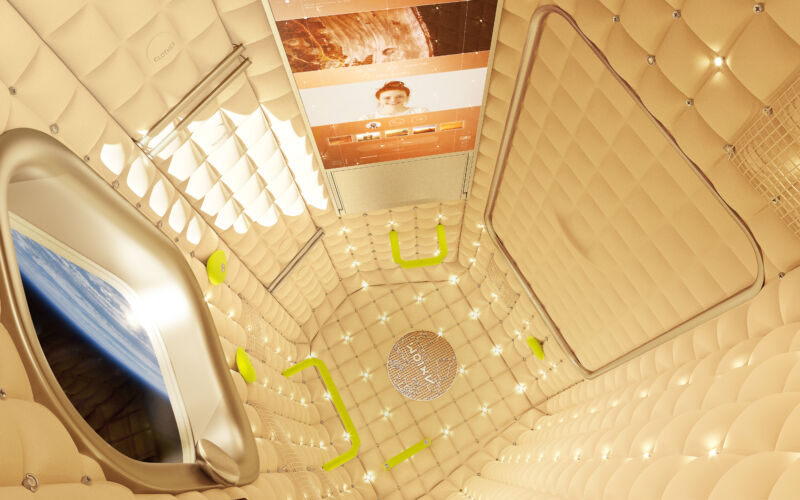Station struggles —
"The business model had to change."

Enlarge / Rendering of an individual crew quarter within the Axiom habitat module.
Axiom Space
Axiom Space is facing significant financial headwinds as the company attempts to deliver on two key commercial programs for NASA—the development of a private space station in low-Earth orbit and spacesuits that could one day be worn by astronauts on the Moon.
Forbes reports that Axiom Space, which was founded by billionaire Kam Ghaffarian and NASA executive Mike Suffredini in 2016, has been struggling to raise money to keep its doors open and has had difficulties meeting its payroll dating back to at least early 2023. In addition, the Houston-based company has fallen behind on payments to key suppliers, including Thales Alenia Space for its space station and SpaceX for crewed launches.
"The lack of fresh capital has exacerbated long-standing financial challenges that have grown alongside Axiom’s payroll, which earlier this year was nearly 1,000 employees," the publication reports. "Sources familiar with the company’s operations told Forbes that co-founder and CEO Michael Suffredini, who spent 30 years at NASA, ran Axiom like a big government program instead of the resource-constrained startup it really was. His mandate to staff up to 800 workers by the end of 2022 led to mass hiring so detached from product development needs that new engineers often found themselves with nothing to do."
The report underscores a lot of what Ars has been hearing about the financial struggles of Axiom in recent months. Dozens of employees have been laid off, and Thales officials have made no secret of their discontent at not being paid in full for the production of pressure modules for the Axiom space station. Although the departure of Suffredini as chief executive was framed as being his decision for personal reasons, it seems probable that he moved out of the company for performance reasons.
Space station troubles
All of this raises significant questions about Axiom's ability to deliver on the primary reason the company was created—to build a successor to the International Space Station. Suffredini joined Ghaffarian in the venture after serving as manager of NASA's space station program for more than a decade. When they founded the company in 2016, the plan was to launch an initial space station module in 2020.
The timeline for station development has since been delayed multiple times. Presently, Axiom plans to launch its first module to the International Space Station no earlier than late 2026. And the company's ambitions have been downsized, according to the report. Instead of a four-module station that would be separated from the government-operated space station by 2030, Axiom is likely to go forward with a smaller station consisting of just two elements. This station would have lower power and reduced commercial potential, according to the article.
"The business model had always counted on having significant power for microgravity research, semiconductor production, and pharmaceutical production, plus supporting life in space," a source told the publication. "The business model had to change… and that has continued to make it challenging for the company to get around its cash flow issues."
Axiom is one of several companies—alongside Blue Origin, Voyager Space, Vast Space, and potentially SpaceX—working with NASA to devise commercial replacements for the International Space Station after that facility retires in 2030.
NASA plans to issue a "request for proposals" for the second round of commercial space station contracts in 2025 and make an award the following year. Multiple sources have indicated that the space agency would like to award at least two companies in this second phase. However, Ghaffarian told Forbes that he would prefer NASA to decide next year and award a single competitor.
"Today there's not enough market for more than one," he said.
This may be true, although some of Axiom's competitors may dispute it. Nevertheless, Ghaffarian's desire for an award next year, and for a sole winner, underscores the evident urgency of Axiom's fundraising needs.
Dragons and spacesuits
The report also notes that Axiom has lost significant amounts of funding on three private astronaut missions it has flown to the International Space Station to date. Ghaffarian said these missions were conducted at a loss to build relationships with global space agencies. This does make some sense, as space agencies in Europe, the Middle East, and elsewhere are likely to be customers of commercial space stations in the next decade. However, Axiom is ill-positioned to absorb such launches financially.
The publication reveals that Axiom is due to pay $670 million to SpaceX for four Crew Dragon missions, each of which includes a launch and ride for four astronauts to and from the station encompassing a one- to two-week period. This equates to $167.5 million per launch, or $41.9 million per seat.
Axiom's other major line of business is a $228 million development contract with NASA to develop spacesuits for the Artemis Program, which will allow astronauts to venture outside the Starship lunar lander on the Moon's surface. According to the Forbes report, this initiative has pulled resources away from the space station program.
Multiple sources have told Ars that, from a financial and technical standpoint, this spacesuit program is on better footing than the station program. And at this point, the spacesuit program is probably the one element of Axiom's business that NASA views as essential going forward.